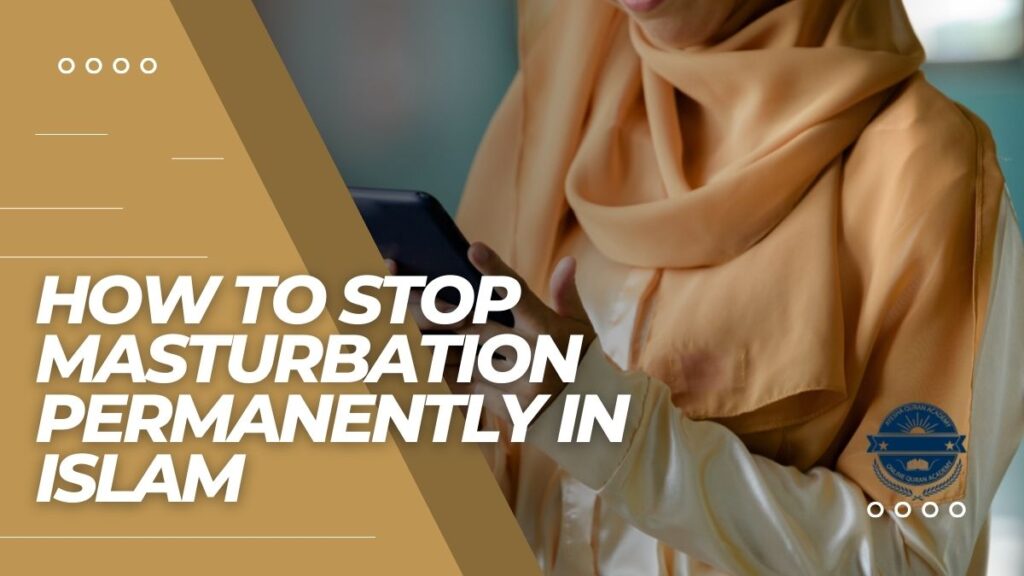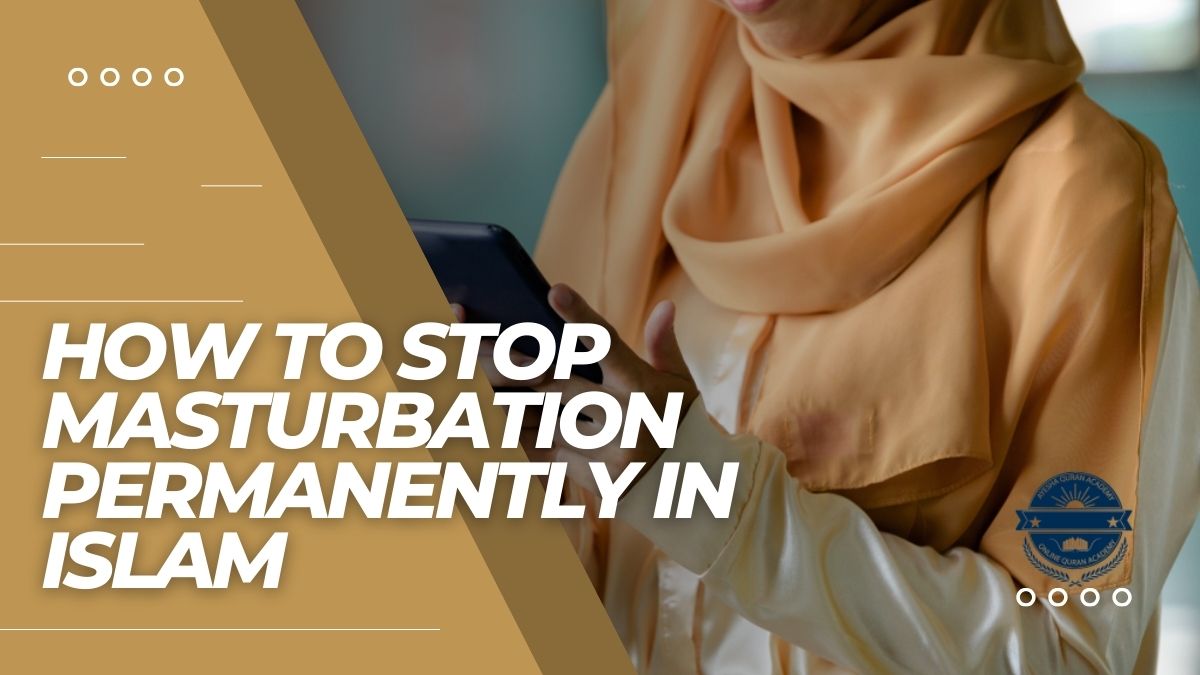Masturbation is a common concern for many individuals, and in the context of Islam, it is viewed as a sinful act.
This comprehensive guide aims to provide you with valuable insights and strategies on how to stop masturbation permanently in Islamic principles.

Understanding the Issue
Masturbation is a common concern among individuals, and it’s essential to understand the gravity of the issue. It involves engaging in sexual self-stimulation, typically resulting in orgasm. In Islam, this act is considered a sinful deviation from modesty and self-control.
Understanding the issue entails acknowledging that it is a behavior that needs to be addressed seriously, both from a religious and personal development perspective.
Seeking Guidance
In the journey to stop masturbation permanently in Islam, seeking guidance is crucial. This involves reaching out to knowledgeable individuals who can provide insights and advice.
One should consider consulting religious scholars who have expertise in Islamic jurisprudence (fiqh) and can offer guidance based on Quranic teachings and Hadith (Prophet’s sayings).
Additionally, speaking to a trusted mentor or counselor can provide valuable support and practical strategies for overcoming this challenge.
How to Stop Masturbation Forever Permanently
1. Self-reflection and Repentance
Identifying Personal Triggers
Masturbation often has underlying emotional or psychological triggers. Self-reflection involves introspection to identify these triggers.
It means asking yourself why you engage in this behavior. Is it due to stress, loneliness, boredom, or other emotional factors? Identifying these triggers is essential for developing effective strategies to overcome them.
Repenting Sincerely
Repentance (Tawbah) is a fundamental concept in Islam. Sincere repentance involves feeling remorse for past actions and turning to Allah (SWT) with a pure heart, seeking forgiveness. It’s not just about feeling guilty but making a firm intention to stop the sinful behavior and genuinely seeking Allah’s guidance in this journey towards self-control.
2. Building Strong Willpower
Strengthening Self-Discipline
Self-discipline is the ability to control one’s actions and impulses. Building strong willpower means developing the capacity to resist temptations, including the urge to masturbate. This can be achieved by setting clear boundaries and adhering to them, even when faced with triggers or challenging situations.
Developing a Daily Routine
Establishing a daily routine can help you stay focused on your goal. Allocate specific times for prayer, work, exercise, and other productive activities. A structured daily routine minimizes idle moments, reducing the opportunity for engaging in the undesirable behavior.
3. Avoiding Temptations
Reducing Exposure to Triggers
To stop masturbating permanently in Islam, it’s crucial to reduce exposure to triggers. This may involve limiting access to explicit content, such as adult websites or explicit materials. Avoiding situations or environments that may lead to temptation is essential for success.
Managing Idle Time Effectively
Idle time often leads to unhealthy habits. Managing idle time involves filling it with meaningful and productive activities. Reading, learning, volunteering, or engaging in hobbies can divert your attention away from masturbation.
4. Cultivating Positive Habits
Engaging in Physical Activities
Regular physical exercise not only contributes to physical health but also helps reduce sexual tension and stress. Engaging in physical activities can serve as a healthy outlet for energy and emotions.
Pursuing Productive Hobbies
Finding constructive and enjoyable hobbies can be an effective distraction from the desire to masturbate. Pursuing creative and productive interests can channel your energy and attention in a positive direction.
5. Mindfulness and Meditation
Staying Present in the Moment
Mindfulness is the practice of being fully present in the moment. It involves paying attention to your thoughts, feelings, and sensations without judgment. Practicing mindfulness can help you become more aware of triggers and redirect your focus when inappropriate thoughts arise.
Finding Inner Peace
Meditation and deep breathing exercises can contribute to finding inner peace and tranquility. These practices reduce anxiety and can be valuable tools for controlling impulses associated with masturbation.
6. Social Support
Opening Up to Trusted Friends or Family
Sharing your struggle with trusted friends or family members can provide emotional support and accountability. It allows you to confide in someone you trust and receive encouragement and guidance.
Joining a Support Group
Consider joining a support group or seeking professional help if self-control proves challenging. Support groups provide a sense of community and offer guidance from others facing similar challenges. Professional therapy can provide tailored strategies for overcoming the habit.
7. Utilizing Technology Wisely
Filtering Explicit Content
Technology can be a useful ally in this journey. Installing content filters and parental controls on devices can help block explicit material, reducing exposure to triggers.
Monitoring Screen Time
Limiting screen time, especially on devices that may expose you to explicit content, can be instrumental in your efforts to stop masturbation permanently. Less exposure to triggering material makes it easier to maintain self-control.
8. Praying for Strength
Seeking Allah’s Help Through Prayer
In Islam, prayer (Salah) is a means of seeking Allah’s help and guidance. Turning to Allah (SWT) in prayer can provide the strength and determination needed to overcome the challenge of masturbation. Faith and spirituality play a significant role in this journey.
Embracing Faith as a Source of Strength
Embracing your faith and spirituality can serve as a powerful source of motivation and strength. Belief in Allah’s mercy and the desire to lead a purer life can drive your commitment to stop masturbating permanently.
9. Dealing with Relapses
Understanding That Setbacks May Occur
Relapses are common in any journey of self-improvement, including overcoming masturbation. It’s important to understand that occasional setbacks are part of the process. Instead of dwelling on them, focus on learning from your mistakes and recommitting to your goal.
10. Maintaining Consistency
Staying Committed to Change
Consistency is key to breaking free from this habit. Stay committed to your goal of quitting masturbation, even when faced with challenges. Remind yourself daily of the reasons you embarked on this journey and the benefits it brings.
Tracking Progress
Keeping a journal to track your progress is beneficial. Record your successes, no matter how small, and use them as motivation to continue on your path to self-improvement.
11. Understanding the Rewards
Recognizing the Spiritual Benefits
Recognizing the spiritual benefits of stopping masturbation is essential. As you make progress, you’ll experience a purer heart, a stronger connection with Allah (SWT), and a sense of spiritual fulfillment. These rewards are worth the effort and commitment required to overcome this challenge.
Conclusion
Overcoming the challenge of how to stop masturbating permanently in Islam requires determination, self-discipline, and seeking Allah’s guidance. By following the strategies outlined in this guide and maintaining a strong connection to your faith, you can move toward a purer, more fulfilling life.
Remember that setbacks may occur, but with persistence and faith, you can achieve your goal.
Related Post
- Are Tampons Haram | Can Muslims Women Use It
- Is It Haram to Think Sexually?
- Are Tattoos Haram In Islam | Can Muslims Practice Tattooing
Frequently Asked Questions (FAQs)
The amount of calories in semen ranges from 5 to 25 per teaspoon, but there is limited research to support this claim.
Yes, masturbation is generally considered forbidden (haram) in Islam as it goes against the principles of modesty and self-control.
Absolutely. Seeking the guidance of a qualified therapist or counselor can be a beneficial step in overcoming the challenge of masturbation.
The duration varies from person to person. It depends on factors such as determination, support, and individual circumstances.
If you relapse, don’t lose hope. Repent sincerely, learn from the experience, and redouble your efforts to stay on track.
Yes, Allah is oft-forgiving and merciful. Sincere repentance is always accepted.


